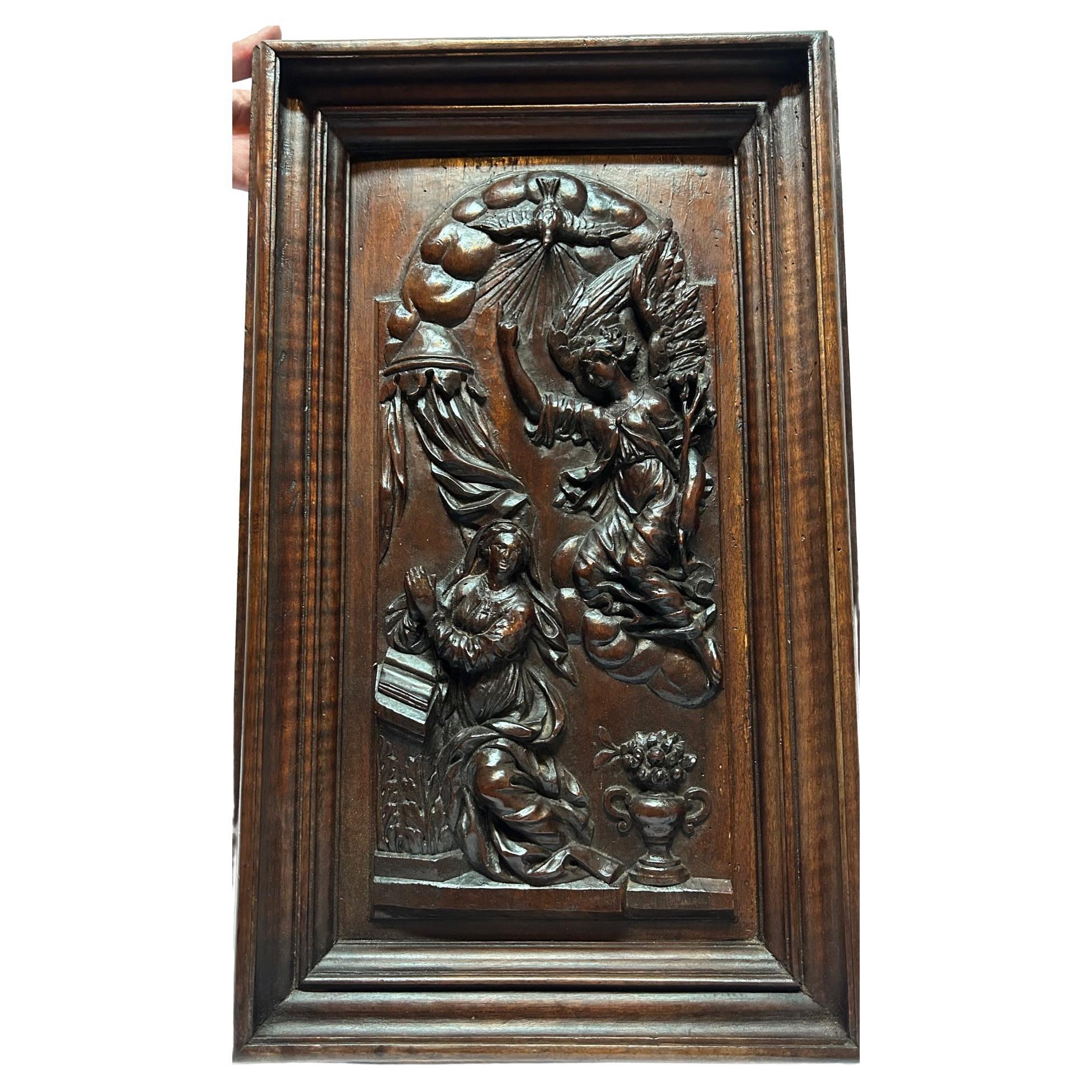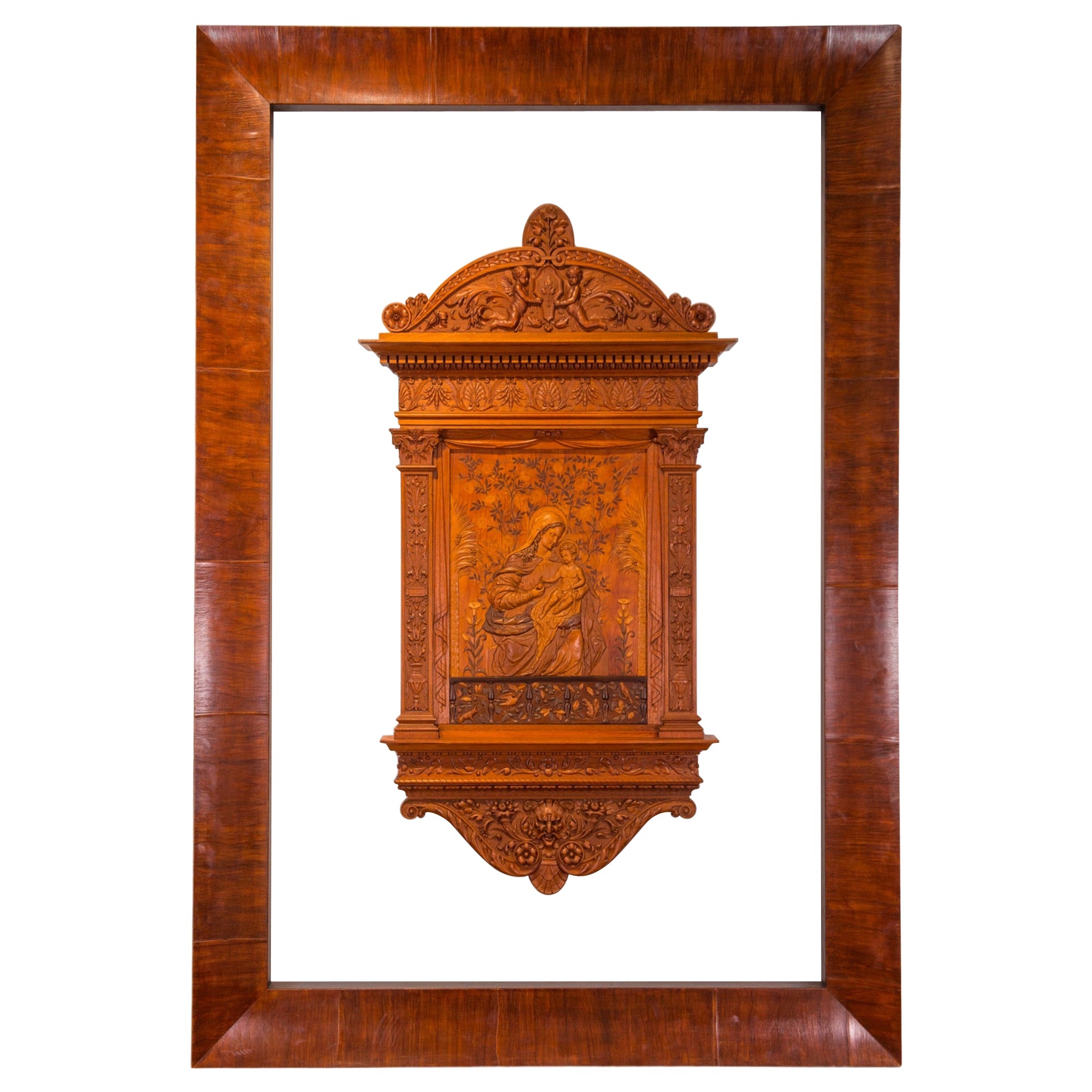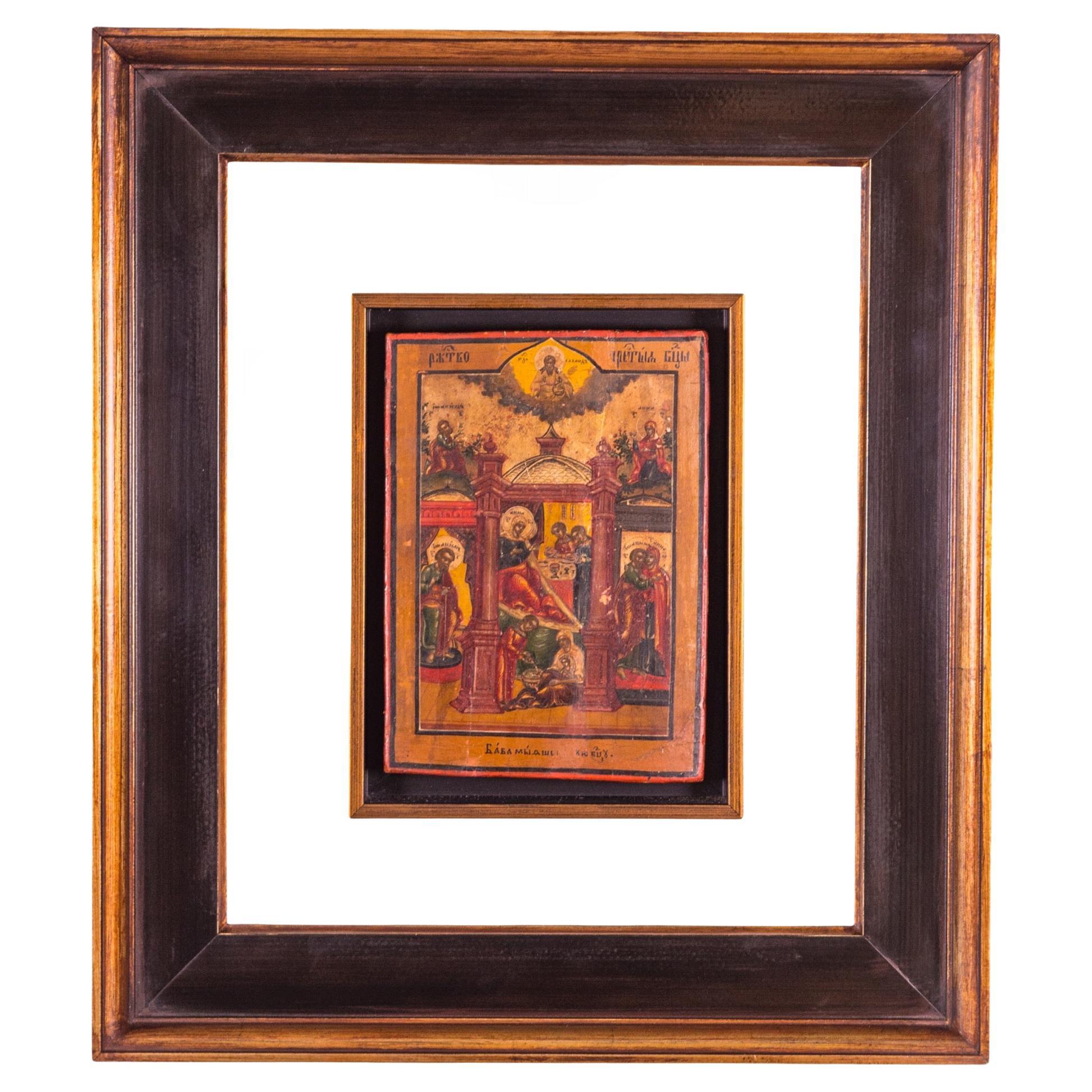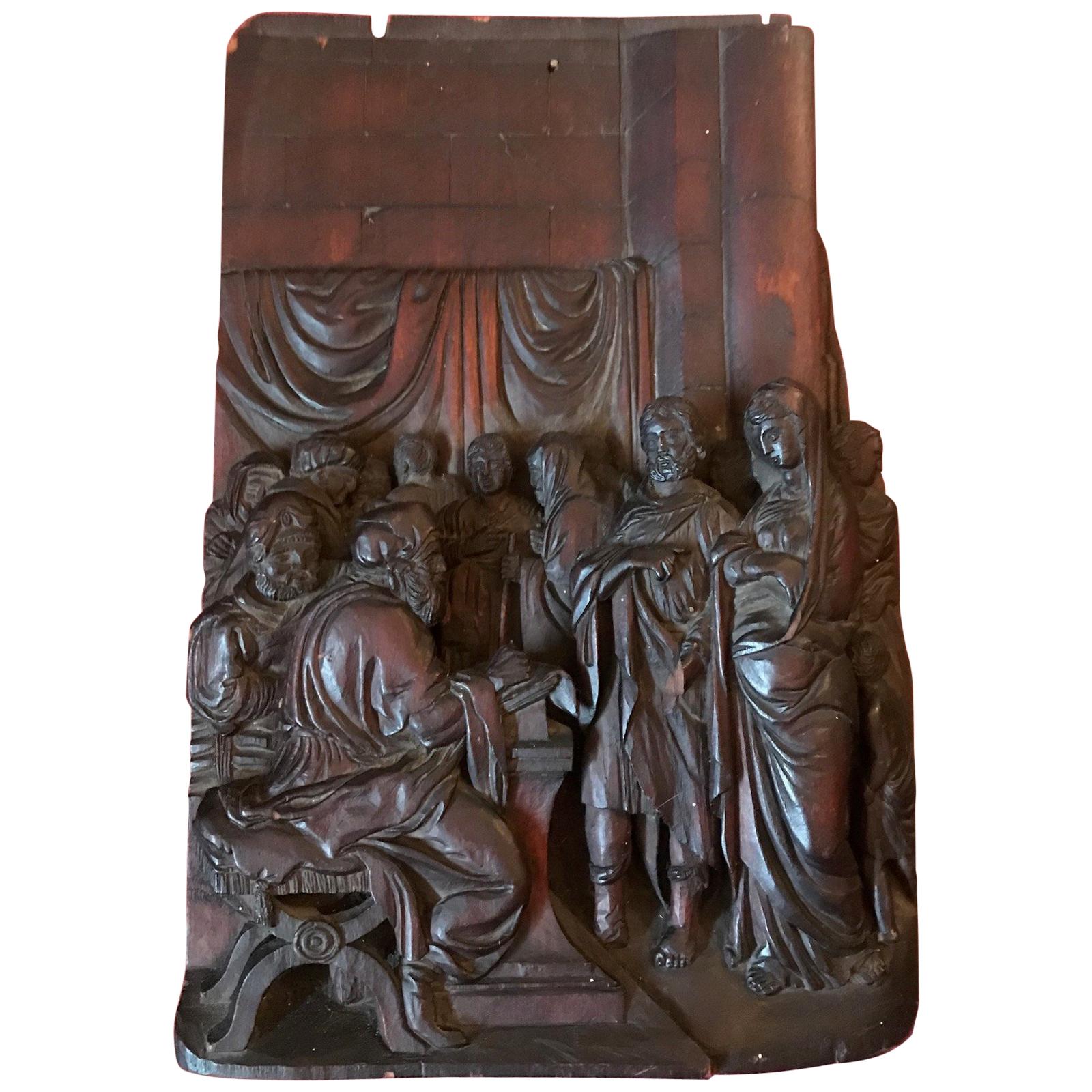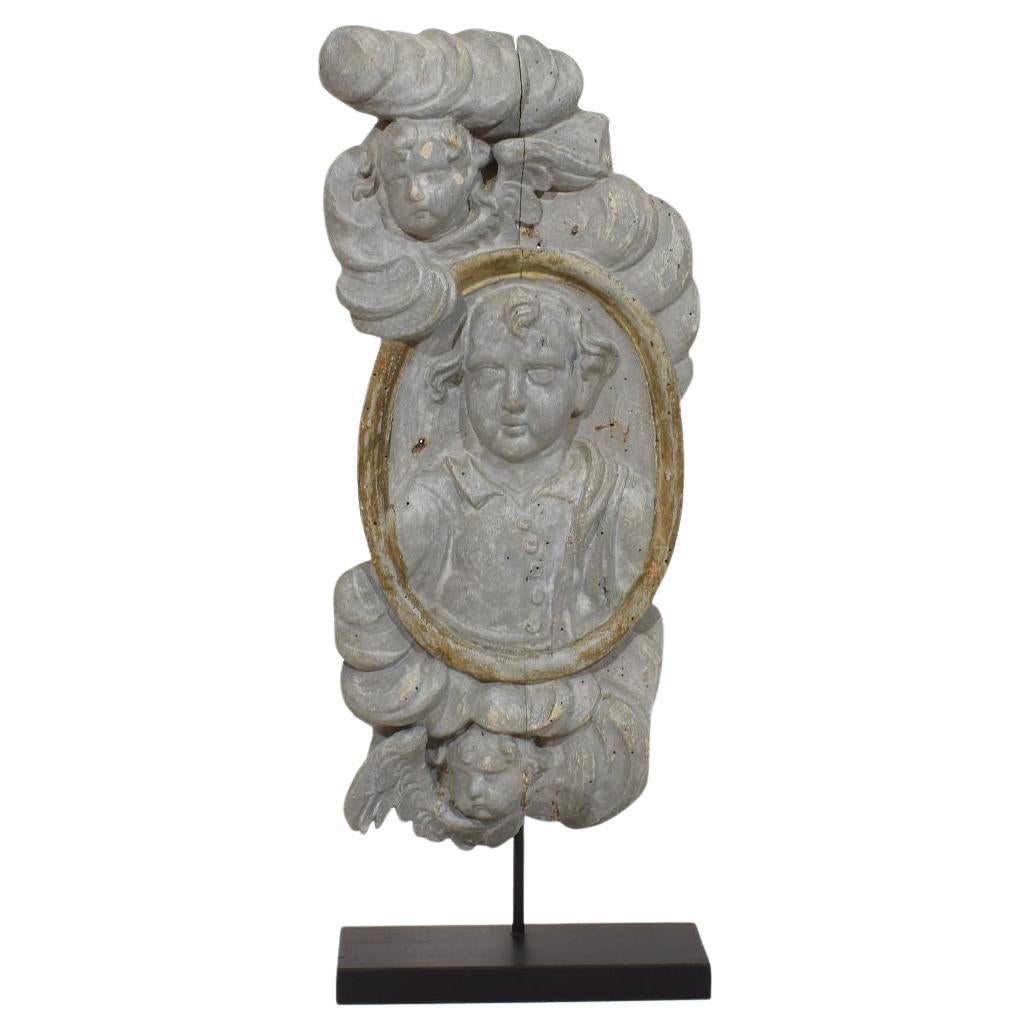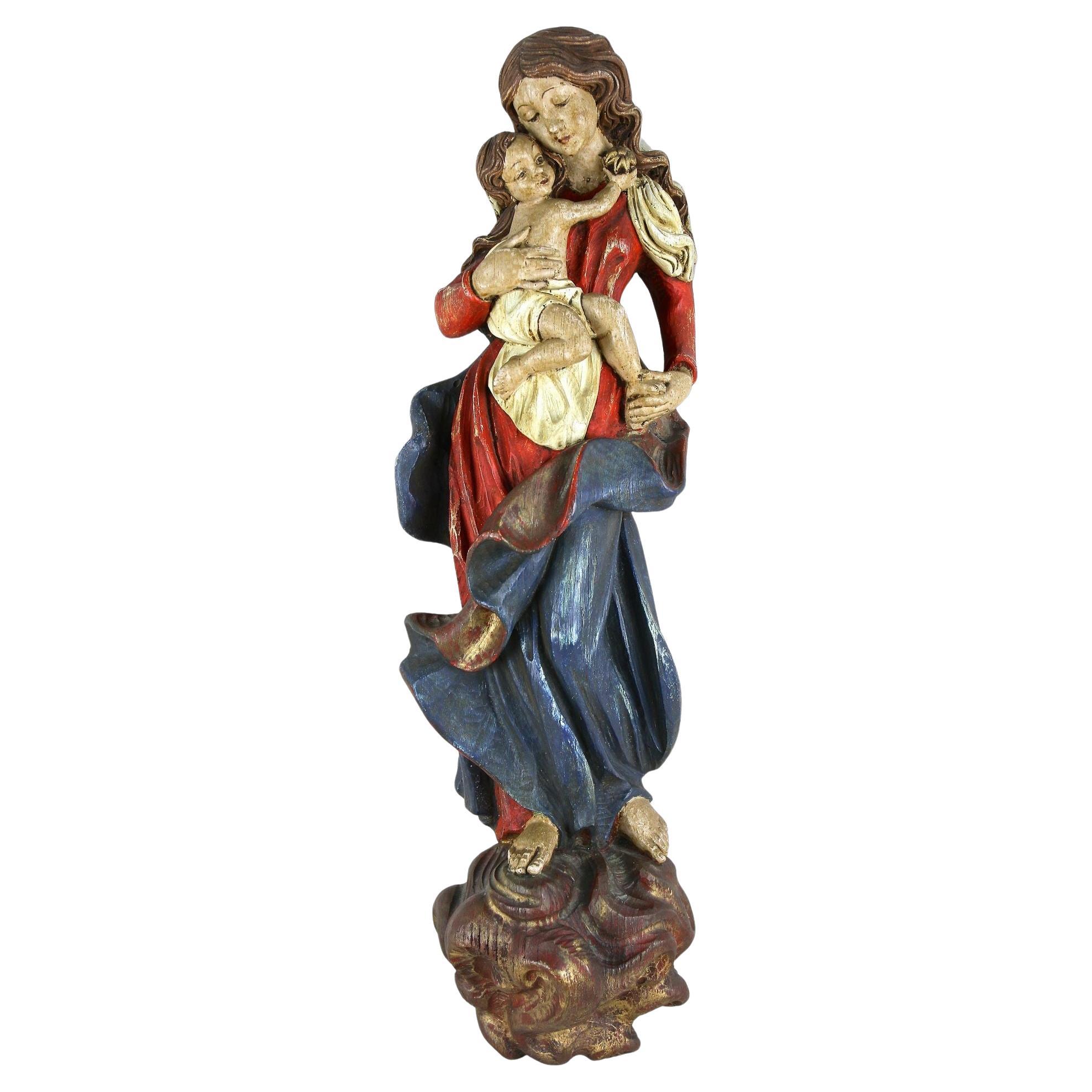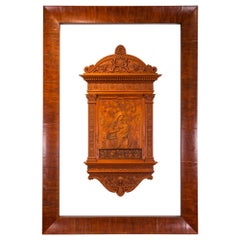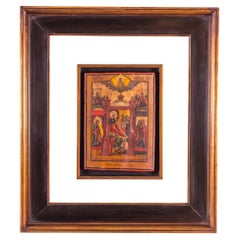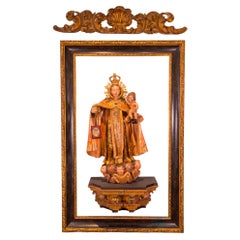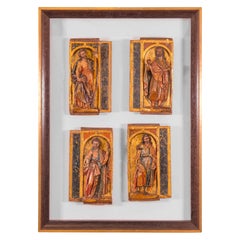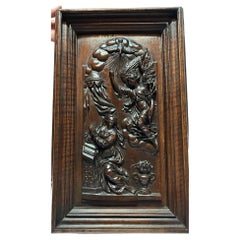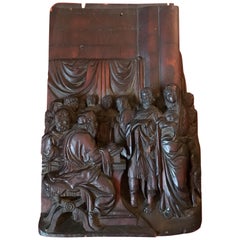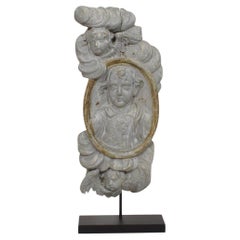Items Similar to The Betrothal and Love of Mary and Joseph, 1500-1600s, Carved Wood Polychromed
Want more images or videos?
Request additional images or videos from the seller
1 of 10
The Betrothal and Love of Mary and Joseph, 1500-1600s, Carved Wood Polychromed
$42,950
£32,792.13
€37,891.02
CA$60,293.67
A$67,203.58
CHF 35,259.41
MX$820,665.24
NOK 446,460.80
SEK 421,973.37
DKK 282,797.17
About the Item
Early 16th Century Spanish carved-wood and polychromed panel of The Betrothal and Love of Joseph and Mary mounted on a Lucite panel and framed with a walnut wood hand-finished frame.
- Dimensions:Height: 42 in (106.68 cm)Width: 32 in (81.28 cm)Depth: 6.5 in (16.51 cm)
- Style:Renaissance (Of the Period)
- Materials and Techniques:
- Place of Origin:
- Period:
- Date of Manufacture:16th Century
- Condition:Wear consistent with age and use. Minor losses. Minor structural damages. Minor fading.
- Seller Location:North Miami, FL
- Reference Number:1stDibs: LU6132226697892
About the Seller
3.7
Vetted Professional Seller
Every seller passes strict standards for authenticity and reliability
Established in 2000
1stDibs seller since 2021
22 sales on 1stDibs
Typical response time: 2 hours
- ShippingRetrieving quote...Shipping from: North Miami, FL
- Return Policy
Authenticity Guarantee
In the unlikely event there’s an issue with an item’s authenticity, contact us within 1 year for a full refund. DetailsMoney-Back Guarantee
If your item is not as described, is damaged in transit, or does not arrive, contact us within 7 days for a full refund. Details24-Hour Cancellation
You have a 24-hour grace period in which to reconsider your purchase, with no questions asked.Vetted Professional Sellers
Our world-class sellers must adhere to strict standards for service and quality, maintaining the integrity of our listings.Price-Match Guarantee
If you find that a seller listed the same item for a lower price elsewhere, we’ll match it.Trusted Global Delivery
Our best-in-class carrier network provides specialized shipping options worldwide, including custom delivery.More From This Seller
View AllThe Virgin Mary Handing an Apple to Jesus as a Child, 19th Century, Carved-Wood
Located in North Miami, FL
Early 19th Century Italian carved-wood in high relief composed of various types of woods set into a marquetry panel with flat inlaid scrolling fruit tree foliage. The piece is compri...
Category
Antique 19th Century Italian Neoclassical Wall-mounted Sculptures
Materials
Acrylic, Lucite, Wood, Mahogany, Maple, Walnut, Burl
Nativity of the Mother of God, 17th Century
Located in North Miami, FL
Late 17th Century Russian Orthodox Icon of the Nativity of the Mother of God painted over gold leaf and gesso laid on a wooden board. It has been framed with a gold gilded museum mou...
Category
Antique 17th Century Russian Baroque Wall-mounted Sculptures
Materials
Gold Leaf
$7,600 Sale Price
20% Off
16th Century Our Lady of Mount Carmel, Gold Gilded and Polychromed
Located in North Miami, FL
16th Century Spanish gold gilded and polychromed Carved-wood sculpture of Our Lady of Mount Carmel. She depicts the Blessed Virgin Mary in her...
Category
Antique 16th Century Spanish Renaissance Wall-mounted Sculptures
Materials
Gold Leaf
$38,000 Sale Price
20% Off
Four Evangelists, 12th Century, Gold Gilded and Polychromed Carved-Wood Purcha
Located in North Miami, FL
12th Century Spanish (Romanesque Period) gold gilded and polychromed carved-wood plaques of the four Evangelists; Matthew, Mark, Luke, and John, the a...
Category
Antique 15th Century and Earlier Spanish Wall-mounted Sculptures
Materials
Gold Leaf
Omnipresence of God, 16th Century, Carved Wood Panel
Located in North Miami, FL
A pair of 16th Century Spanish altar panels of Cherubs Representing the Omnipresence of God mounted on a Lucite panel with a double frame of hand-carved ...
Category
Antique 16th Century Spanish Wall-mounted Sculptures
Materials
Gold Leaf
The Madonna with Christ Child and the Infant St. John the Baptist, Hand Painted
Located in North Miami, FL
Late 16th century Italian school oil on a wood panel painting of The Madonna with Christ Child and the infant St. John the Baptist. Mount Vesuvius is erupting in the background. This painting was part of the collection of Fred B...
Category
Antique 16th Century Italian Wall-mounted Sculptures
Materials
Wood
You May Also Like
17th Century Walnut French sculptures, depicting the Annunciation.
Located in Esbeek, NL
4 Evangelist of walnut, 17th Century
French
Category
Antique 17th Century French Wall-mounted Sculptures
Materials
Walnut
17th Century Early Baroque Flemish Wood Carved Religious Figural Group
Located in Vero Beach, FL
This rare 17th century panel, carved in high relief, is museum quality and without doubt the work of an important Flemish master carver. It represents the biblical scene of Mary and Joseph in Bethlehem for the census. Multiple figures surround the center in a well balanced setting. Rich, deep color and great patina, which developed over about 400 years, make this piece of art exceptional. The panel is mounted on a later dusty rose velvet backing.
Condition: Small part of backdrop on right is missing. Joseph’s left hand is missing.
Measurements:
Image size - 8 ½” W x 12 ¼” H x 2” D
Back panel - 10 ¼” W x 14” H x ½” D
Entire piece - 10 ¼” W x 14” H x 2 ½” D
Weight: 2 lbs. 8 oz.
Category
Antique 17th Century Belgian Baroque Religious Items
Materials
Wood
$4,280 Sale Price
20% Off
French 17/ 18th Century Carved Wooden Baroque Panel Depicting A Saint And Angels
Located in Buisson, FR
Unique panel depicting a saint figure and Angels. Wonderful layers of its original color,
France, circa 1650-1750 . Weathered, small losses.
Treated against woodworm.
Measurements in...
Category
Antique 17th Century French Baroque Figurative Sculptures
Materials
Wood
$560 Sale Price
46% Off
18th Century Polychrome Virgin & Child Wall Sculpture, Handcarved, AT ca. 1760
Located in Lichtenberg, AT
Exceptionally beautiful, polychromed figural baroque wall sculpture from the period around 1760 in Austria. By showing real craftsmanship, this fantastic looking, sacred wall sculptu...
Category
Antique Mid-18th Century Austrian Baroque Wall-mounted Sculptures
Materials
Softwood
Baroque Wax Plaque of Adoration of the Magi, Italian School 18th C. or Older
Located in West Palm Beach, FL
Baroque Wax Plaque/Carving of Adoration of the Magi
Italian School 18th Century or Older
Pigmented Wax, Wood, Carved and Inlaid Ebony, Glass
A remarkable Baroque wax relief of The A...
Category
Antique 18th Century French Baroque Figurative Sculptures
Materials
Glass, Ebony, Wood
Late 15th Century Polychrome Wood Carving Depicting the Nativity
Located in Saint-Ouen, FR
While the birth of Christ is briefly told in the Gospel of Luke (2, 7) it is in the apocryphal texts that we find most of the elements and details that have then inspired artists. As of the 14th century and even more of the 15th century the subject of the Adoration of the Child replaces in Western art the scene of the Birth, much favoured in Byzantine art. Instead of being depicted lying with the new-born swathed in the manger, the Virgin is now kneeling, her hands joined in prayer in front of the naked child. This change was probably hastened by the popularity of the visions of Saint Bridget of Sweden to whom the Virgin allegedly appeared to show how she had given birth to Jesus (Visions, VII, chap. 21).
Sheltered by a thatch-roofed structure the Virgin is kneeling in front of the Child Jesus. She wears a magnificent red dress under a large gold cloak. Her curled blond hair is partially veiled. The newborn is lying on a straw mat. Joseph is depicted with a parted beard and stands opposite from the Virgin. He wears a tunic and a coat with a purse hanging from the belt. His costume reminds us of the long journey him and Mary have accomplished to reach Bethlehem.
Two other women are present. One is looking through the stable’s window to observe the Holy Family while another one kneels in prayer in front of the divine child. The rich costume of the lady might indicate she is a donator.
However they could also both represent the women who took part in the birth of Christ, Zelemi and Salome. Salome, incredulous did not believe in the virginal conception of Mary and she is represented far from the scene. The artist has depicted her with an expression of doubt on her face. Zelemi, on the contrary, is a believer. She is rewarded by a place of honour at the heart of the scene, close to Mary.
To the left the donkey and ox that have accompanied Mary and Joseph to Bethlehem observe quietly the scene.
On the foreground two angels hold a scroll reading an excerpt from the Gloria : “/Gloria/ in excelsis /Deo/.” One of the angels wears a blue cape while the other’s is red Those two colours are very significant as during Middle-Ages blue symbolises hope and red charity. Together they express the hope in redemption thanks to the advent of Christ and his sacrifice to come.
Above the main scene, up a cliff, a small shepherd lets his herd of sheep graze amidst the trees. He is framed by two walled cities.
This wood carving is the work of a very skilled and inventive artist. The piece bears witness to his exceptional talent. The realism of the scene is emphasised by the amount of details depicted. The refinement of the carving itself is highlighted by the well preserved polychromy.
This key moment of the New Testament is set in a contemporary context thanks to the clothes of the characters and the scenes of rural life. The universal dimension of the scene is intensified while allowing contemporary viewers to grasp its meaning more easily.
This care for details, the picturesque realism as well as the extraordinary rendition of the cloths suggest it was made by a Flemish artist during the late 15th century.
This relief can be compared with the panel of the Nativity from the Saint-Vaast altarpiece made by Jacques Daret between 1433 and 1435, today in Madrid’s Thyssen-Bronemisza Museum.
Literature
Louis Réau, Iconographie de l’Art chrétien...
Category
Antique 15th Century and Earlier Dutch Gothic Figurative Sculptures
Materials
Wood
More Ways To Browse
Gold Frame 16th Century
Jere Flock
Maple Leaf Wall Sculpture
Mcm Metal Wall Sculpture
Nail Starburst Mid Century
Puigdemont Plates
Ron Schmidt Nail Sculpture
Stephen Chun Brutalist
Tim Bessell Surfboard
Wall Sculpture Rhino
William And Bruce Friedle
1950s Wall Brass Bird Sculptures
Ackerman Tile
C Jere Sailboat
Cow Skulls
Curtis Jere Birds In Flight Wall Sculpture
Curtis Jere Butterfly
Emaus Suns
